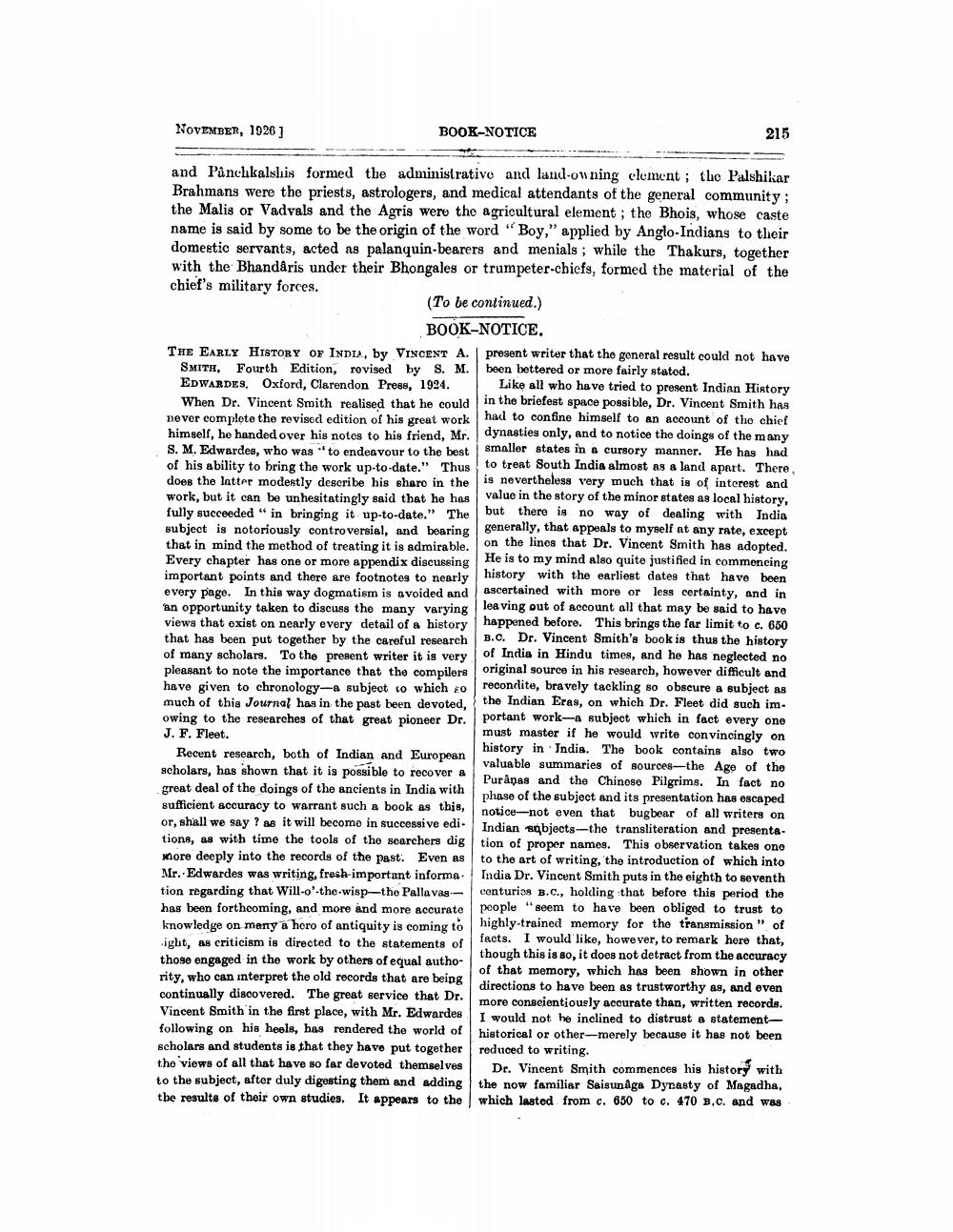________________
NOVEMBER, 1926 ]
BOOK-NOTICE
215
and Panchkalshis formed the administrative and land owning clomont; the Palshikar Brahmans were the priests, astrologers, and medical attendants of the general community; the Malis or Vadvals and the Agris were the agricultural element; the Bhois, whose caste name is said by some to be the origin of the word "Boy," applied by Anglo-Indians to their domestic servants, acted as palanquin-bearers and menials; while the Thakurs, together with the Bhandaris under their Bhongales or trumpeter-chiefs, formed the material of the chief's military forces.
(To be continued.)
BOOK-NOTICE. THE EARLY HISTORY OF INDIA, by VINCENT A. present writer that the general result could not have
SMITH, Fourth Edition, revised by S. M. been bettered or more fairly stated. EDWARDES. Oxford, Clarendon Press, 1924. Like all who have tried to present Indian History
When Dr. Vincent Smith realised that he could in the briofest space possible, Dr. Vincent Smith has never complete the revised edition of his great work had to contine himself to an account of the chief himself, he handed over his notes to his friend, Mr.dynasties only, and to notice the doings of the many 8. M. Edwardes, who was to endeavour to the best smaller states in a cursory manner. He has had of his ability to bring the work up to date. Thus to treat South India almost as a land apart. There does the latter modestly describe his share in the
he his share in the is nevertheless very much that is of interest and work, but it can be unhesitatingly said that he has value in the story of the minor states as local history. fully succeeded in bringing it up-to-date." The
but there is no way of dealing with India subject is notoriously controversial, and bearing
generally, that appeals to myself at any rate, except that in mind the method of treating it is admirable.
on the lines that Dr. Vincent Smith has adopted. Every chapter has one or more appendix discussing
He is to my mind also quite justified in commencing important points and there are footnotes to nearly
history with the earliest dates that have been every page. In this way dogmatism is avoided and ascertained with more or less certainty, and in an opportunity taken to discuss the many varying leaving out of account all that may be said to have views that exist on nearly every detail of a history happened betore. This brings the far limit to c. 650 that has been put together by the careful research
B.C. Dr. Vincent Smith's book is thus the history of many scholars. To the present writer it is very
of India in Hindu times, and he has neglected no pleasant to note the importance that the compilers
original source in his research, however difficult and have given to chronology-a subject to which to
recondite, bravely tackling so obscure a subject as much of this Journal has in the past been devoted, the Indian Eras, on which Dr. Fleet did such im. owing to the researches of that great pioneer Dr. portant work- subject which in fact every one J. F. Fleet.
must master if he would write convincingly on Recent research, both of Indian and European
history in India. The book contains also two
valuable summaries of sources-the Age of the scholars, has shown that it is possible to recover a
Puranas and the Chinose Pilgrims. In fact no great deal of the doings of the ancients in India with
phase of the subject and its presentation has escaped sufficient accuracy to warrant such a book as this,
notice-not even that bugbear of all writers on or, shall we say ? as it will become in successive edi.
Indian sobjects--the transliteration and presente. tions, as with time the tools of the searchers dig tion of proper names. This observation takes ono more deeply into the records of the past. Even as to the art of writing, the introduction of which into Mr. Edwardes was writing, fresh-important informe India Dr. Vincent Smith puts in the eighth to seventh tion regarding that Will-o'-the-wisp--the Pallavas- centurios B.C., holding that before this period the has been forthcoming, and more and more accurate
people "seem to have been obliged to trust to knowledge on meny a hero of antiquity is coming to
highly trained memory for the transmission " of ight, as criticism is directed to the statements of
facts. I would like, however, to remark here that,
though this is so, it does not detract from the accuracy those engaged in the work by others of equal autho
of that memory, which has been shown in other rity, who can interpret the old records that are being
directions to have been as trustworthy as, and even continually discovered. The great service that Dr.
more conscientiously accurate than, written records. Vincent Smith in the first place, with Mr. Edwardes
I would not he inclined to distrust a statementfollowing on his heels, has rendered the world of
historical or other-merely because it has not been scholars and students is that they have put together reduced to writing. the views of all that have so far devoted themselves Dr. Vincent Smith commences his history with to the subject, after duly digesting them and adding the now familiar Saisunaga Dynasty of Magadha, the results of their own studies. It appears to the which lasted from c. 650 to c. 470 B.C. and was




